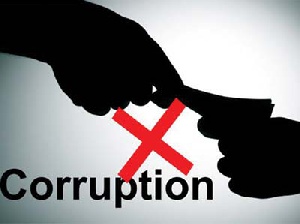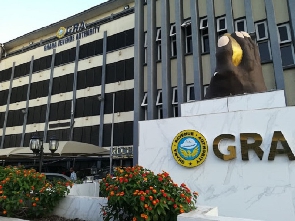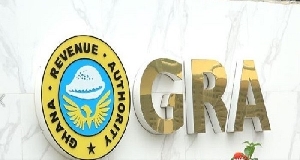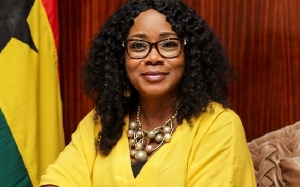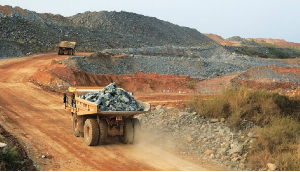It was not the least surprising at all when sometime last year Mr Bagbin, the MP for Nadoli Kaleo and the NDC’s 2019 presidential contestant, attributed the humiliating defeat of Mahama and the National Democratic Congress (NDC) in the 2016 general elections to bad governance amid unbridled sleazes and corruption (See: ‘Mahama's boys bought V8, built mansions in 4 years – Bagbin; myjoyonline.com/ghanaweb.com, 19/08/2018).
Mr Bagbin lamented: “Don’t tell me that the boys that suddenly came closer to the president within four years can build mansions and buy land cruisers and you say there are no resources, where are they getting the money, their salaries?”
Truth be told, Mr Bagbin could not have said it any better: former President Mahama and the NDC appointees had enough opportunity to show discerning Ghanaians their ability to steer the nation to the right direction but they woefully failed to do so.
Given their abysmal performance, some of us cannot comprehend how and why former President Mahama and his NDC apparatchiks would move heaven and earth to return to the presidency so soon.
Considering the admissible evidence of coarse governance by the erstwhile NDC administration, one cannot help but to agree with those who insist that former President Mahama lacks effective leadership skills to steer a country like Ghana to the right direction.
Take, for example, the vast majority of Ghanaians were not pleased with the GH12 million import tax evasion by the sibling of former President Mahama, Ibrahim Mahama.
If you may recall, following the NDC’s humiliating 2016 election defeat, the Honourable Kennedy Agyapong came out and told Ghanaians that former President Mahama’s brother, Ibrahim Mahama, had been evading import taxes over the past few years.
The Honourable Agyapong was however rebuked, scoffed at, and queried repeatedly about the veracity of the seeming sensational story. But alas, he was proved right by the Ghana Revenue Authority (GRA).
Consequently, the EOCO ordered Ibrahim Mahama to pay GH12 million as all his previous 44 cheques were dishonoured by the respective banks. How bizarre?
As a matter of fact, Ghana under the erstwhile Mahama administration went into economic asphyxiation which regrettably brought to pass harsh socio-economic standards of living.
In fact, contending schools of thought maintain that NDC lost the 2016 election largely due to gargantuan corruption scandals (Bus branding, SADA, SUBA, GYEEDA, SSNIT, STS Housing deal, the Brazilian aircraft deal, Mahama’s Ford Expedition Vehicle, amongst others).
It is, therefore, quite bizarre that the NDC loyalists who are currently enjoying uninterrupted electricity, low inflation, tax reductions, favourable economic growth, gargantuan savings on free SHS amongst others, are gleefully clamouring for the return of Ex-President Mahama and their beloved NDC.
We could, therefore, argue that the diehard supporters of Mahama are living in a denial about former President Mahama’s popularity and competency.
During Mahama’s calamitous administration, the vast majority of Ghanaians struggled to make a living or eke out income. The dreadful errors in decision-making, the incompetence and the unbridled corruption culminated in untold economic hardships.
And, despite the apparent harsh socio-economic standards of living back then, President Mahama and his clamorous apologists kept trumpeting their vague rhetoric , political insobrieties and meaningless slogans: ‘Mahama Tuaso’; ‘We care for you’; ‘people matter, you matter’; ‘we are transforming lives’.
Given the circumstances back then, I do not want to believe that anyone could have convinced the disappointed Ghanaians to forgive the NDC administration over the dubious judgement debt payment of GH51.2 million to Woyome and other corrupt practices.
It is absolutely true that the vociferous NDC communicators could not solicit votes from Ghanaians who were extremely aggrieved about President Mahama’s freebies to all sort of people, including Madam Akua Donkor of Ghana Freedom Party (GFP) two four wheel drive cars and a luxury bungalow (estimated to cost a staggering $470,000) for no work done.
The fact of the matter is that no one would have listened to the NDC’s electioneering campaigners when no meaningful efforts were put in place to stop the numerous sleazes and corruption.
Trust me, it would be easier for ‘a camel to go through the eye of a needle’ than for Mahama to convince unhappy Ghanaians to forgive him, when his administration woefully shrunk Ghana’s GDP from $47 billion to $37 billion in five years.
How would the Mahama supporters expect discerning Ghanaians to give Mahama another chance at the presidency when his government terribly dragged an economic growth of around 14% in 2011 to a nauseating 3.4% as of December 2016?
It is absolutely true that the Mahama’s government focused primarily on so-called infrastructural projects and failed terribly to initiate expedient policies and programmes to overturn the failed policies of agriculture, poverty reduction and resource allocation in the areas of healthcare, education, finance, supply chain management and security sector planning, amongst others.
Bagbin was absolutely right in pointing out the rampant corruption in the erstwhile NDC administration.
In fact, like Bagbin, many observers believe that former President Mahama and his government’s woeful errors in judgement and alleged corrupt practices resulted in excessive public spending, less efficient tax system, needless high public deficit and destabilization of national budgets, heightened capital flight and the creation of perverse incentives that stimulate income-seeking rather than productive activities.
On the whole, the critics contend that former President Mahama’s government remains the worst ever in the Ghanaian political history.
However, the loyalists of former President Mahama hold a faint hope that he remains their greatest asset, who could recapture power from the NPP in 2020.
Indeed, the sceptics may not be far from right for contending vehemently that but for the needless interference of the NDC tradition in the governance of the country for well over 27 years, Ghana would have developed meaningfully by now.
K. Badu, UK.
k.badu2011@gmail.com
Opinions of Wednesday, 28 October 2020
Columnist: K. Badu, UK

